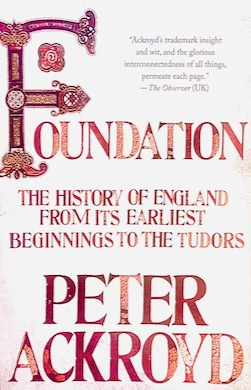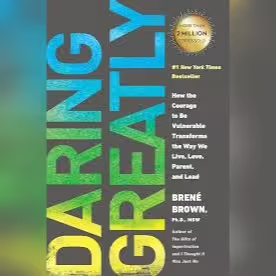This book review of Foundation by Peter Ackroyd is part of my World History Reading Quest.
This post pay contain affiliate links, which means that I may receive a commission if you make a purchase using these links. As an Amazon Associate I earn from qualifying purchases. Thanks for helping to support the content on this site.

Foundation: The History of England from Its Earliest Beginnings to the Tudors
- Author: Peter Ackroyd
- Series: History of England, Volume 1
- Genre: Non-Fiction, History
- Publisher: Pan Macmillan
- Pages: 536 pages, Paperback
The story of Arthur may not be true, but it is real.
Peter Ackroyd, Foundation: The History of England from Its Earliest Beginnings to the Tudors
Going in to reading Foundation, I was prepared for a dense history lesson – which I don’t mind. What I got instead, though, was a pretty fascinating narrative that blends myth, fact, and imagination into what felt like a fairly comprehensive view of England’s early history. Admittedly, I’m new to this subject, and as an American, have not been steeped in it throughout my life. But still, I was impressed how Ackroyd doesn’t just recount events—he brings them to life. From the shadowy figures of pre-Roman Britain to the rise of the Tudor dynasty, it all felt very relatable and understandable.
I really appreciated the way Ackroyd uses smaller stories to link to the larger events going on, even at times blending an appropriate level of humor into the mix. It made what could be very dense and dry material enjoyable to read, and helped me get a better grounding in the events of the time period. I easily felt immersed in each of the time periods he covers in this volume.
This book made me infinitely more curious about early English history, it was a really great intro for someone coming at the subject from my perspective (mostly, and mostly completely uninformed American!)
That said, the book isn’t without its flaws. At times, Ackroyd’s love of detail can be both a blessing and a curse. It can admittedly slow the pace in places. Some passages felt so packed with information that they lost a bit of their narrative flow. But overall, Foundation is an engaging and thought-provoking read, perfect for history buffs and casual readers alike.
Historical Context
Foundation takes us on a journey through England’s formative years, from prehistory to just before the Tudor dynasty. This vast time span includes the arrival of the Romans, the chaos of the Dark Ages, the Norman Conquest, and the Plantagenet era.
Ackroyd emphasizes the continuity of English culture through these shifts. He explores how Roman roads became medieval trade routes, and how early myths and legends—like King Arthur—echoed through the centuries. The Norman Conquest of 1066 stands out as a pivotal moment in the book, marking the beginning of a new ruling class and a blending of cultures.
The book also examines the growth of England’s identity. Ackroyd discusses the evolution of language, law, and religion, showing how these elements forged a sense of nationhood. By the end of the book, you understand how this period laid the groundwork for the England we recognize today.
My Review
Myth and Memory
I really loved how Ackroyd weaves mythology into the historical stories he tells. He dives into the stories that shaped how people saw themselves and their world. From the legendary founding of London by Brutus of Troy to the tales of King Arthur, I felt totally immersed and transported into these stories as if they were living, breathing parts of history.
What really stuck with me was how he explores the blurry line between history and legend. At one point, he writes, “The story of Arthur may not be true, but it is real.” I love how this captures the idea that myths can hold emotional and cultural truths, even if the facts don’t check out. They represent the ethos of an era – and that is very much an important part of understanding the history of that era.
Ackroyd also does a great job showing how these stories were used to justify power. Norman rulers tied themselves to Arthur’s legacy to strengthen their claims to the throne, turning myths into tools of politics. This connection between storytelling and authority adds so much depth to the book—it really makes you think about how history is shaped by the people who tell the stories.
Rich Details, But Sometimes Too Much
If I had to pick one thing to nitpick about this book, it would probably be Ackroyd’s attention to detail and when he chooses to apply it. Certainly, his descriptions of medieval life are so vivid that you can almost smell the smoke from village fires or hear the chaos of a bustling marketplace. It’s so immersive and I absolutely love when historians can transport me, almost like I’m in a time machine, to the time and place I’m studying. The way he dives into the daily lives of people makes the history feel so real and relatable.
But there were times when it also felt like just a little too much. Ackroyd has a habit of getting really deep into topics (especailly church politics). Yes, the church is an incredibly foundational element of the history England (pun intended). So I get the focus on those types of detail. And, while it’s clear Ackroyd probably knows his stuff, these sections can drag on at times. For example, a long dive into monastic reforms, while interesting, felt like it overstayed its welcome a bit.
That said, Ackroyd does balance it all really well, so you’re not left slogging through details you’re less interested in for very long. I thought his retelling of the Norman Conquest was electric—it’s full of tension and life. When he describes the Battle of Hastings, you can almost see the tides of the fight shifting and feel the chaos of the battlefield. Those moments kept me hooked and reminded me why I picked up the book in the first place.
Language as a Thread
Ackroyd does a brilliant job of showing how language evolves alongside history. He traces the development of Old English, its melding with Norman French after the Conquest, and the emergence of Middle English. As someone who loves words and their history, this was fun to read about.
I was also impressed with how Ackroyd connects language to identity. It very much resonated with me, particularly in the world we currently live in, that language can be a form of resistance or pride (Ackroyd notes that, “To speak English in the aftermath of the Norman invasion was an act of quiet rebellion.”).
The Role of Faith
Religion plays a central role in Foundation, and I felt like Ackroyd handled it with care and nuance. He doesn’t shy away from the darker aspects of religious history, such as persecution and corruption, but he also acknowledges its centrality to medieval life. He examines how the church controlled nearly every aspect of life, from politics to personal belief. This dual perspective—of faith as both a source of inspiration and oppression—adds complexity to the narrative. That duality, clearly a theme that will play out so many times over in the course of English history.
I also really appreciated the emphasis Ackroyd put on the physical manifestation of faith through the building of cathedrals. As monuments to people’s religious devotion, he describes them so vividly as spaces of awe and wonder. Acroyd sums it up pretty well when he says “To enter a cathedral was to step into the presence of eternity.” That really made me think about what it must have been like for an average person in the middle ages to walk into a cathedral, often the largest and grandest buildings anyone had seen or could imagine – the same awe I feel today when I stand next to a skyscraper maybe, but with the added cultural immersion in religion.
Parting Thoughts
To sum it up, I felt like Foundation was a really engaging read that blended quality narrative and storytelling with facts that you need to know to learn and appreciate this time period in English history. I felt like there’s enough here for a wide audience of reader from beginners to scholars – though I don’t feel qualified to make any judgements on what Ackroyd added to the historical knowledge base on the subject.
I felt like the book was sweeping and ambitious, and delivered both insight and intrigue. Ackroyd’s ability to blend myth, history, and cultural analysis just makes this a really great read, in my opinion. While the dense details may not appeal to everyone, they enrich the narrative if you’re willing to dig in. I think it’s worth it to do so.
And so, I ended up giving this book 4 out of 5 stars. It’s engaging, thoughtful, and often beautiful. If you’re a very casual historian like me, looking for a really broad set of knowledge about key history of people and places in our world, then I think it’s a must-read. I’m looking forward to reading the rest of the books in this series, for sure.
What about you? Have you read Foundation or other books by Ackroyd? Which periods of history captivate you most? Let’s dive into the conversation!
Other Books You Might Enjoy
- Book review of Act of Oblivion by Robert Harris
- Book review of Columbus: The Four Voyages by Laurence Bergreen
About the Author
Peter Ackroyd is a British writer known for his wide-ranging work in fiction, biography, and history. He was born on October 5, 1949, in London and grew up with a love for literature and storytelling. After studying at Clare College, Cambridge, and Yale University, he started his career as a writer and editor. Ackroyd gained early recognition with his novel Hawksmoor (1985), which won the Whitbread Award and the Guardian Fiction Prize. He is famous for his deep dives into English history, writing books like London: The Biography and Foundation: The History of England. Ackroyd has also written biographies of major figures like Charles Dickens, T.S. Eliot, and Sir Isaac Newton. Over his career, he has won several awards, including the Somerset Maugham Award and the James Tait Black Memorial Prize. Known for his rich, atmospheric writing, Ackroyd continues to be celebrated as one of England’s leading literary voices.
Reading Details
Start date: September 27, 2024
Finish date: September 29, 2024


